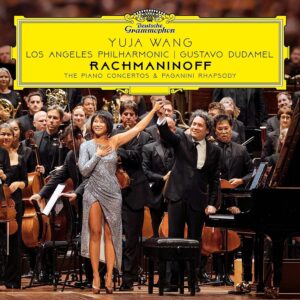The combination of Yuja Wang, Gustavo Dudamel, and Rachmaninov’s complete works for piano and orchestra amounted to a box office sure thing this past February in Los Angeles. How their performances fare on disc is another question, especially in a crowded and intensely competitive market.
Compared to the focused and vividly detailed engineering throughout DG’s recent Rachmaninov cycle with Daniil Trifonov, the present edition’s sonics are relatively skewed and diffuse. The piano overly dominates in the mix, even when relegated to an accompanying role, such as in the Second and Third concertos’ first movements. At the Fourth concerto’s outset, the declamatory piano theme overpowers the soft-edged brass and wind repeated notes (to hear them crackle with life, go to the Idil Biret/Antoni Wit Naxos recording), while the slow movement’s string tuttis convey more heft and direction elsewhere (Hough/Litton and Thibaudet/Ashkenazy, for example).
Problematic balances aside, No. 2 and the Paganini Rhapsody gain significant dynamism and drama over Wang’’s earlier smaller-scaled versions with Abbado and the Mahler Chamber Orchestra. She brings sharper accents and palpable assertion to softer variations, even though the brooding 16th Variation drags where Abbado keeps it afloat. Still, I miss the Wild/Horenstein and Graffman/Bernstein versions’ lively concertante-like pianist/instrumentalist interplay. Her scintillating fingerwork in No. 2’s finale now produces a dazzling array of colors, with little recourse from the sustain pedal.
No. 3 markedly improves on Wang and Dudamel’s 2014 traversal. For starters, the Los Angeles Philharmonic musicians play better than their Simón Bolivár Symphony counterparts. Here Wang takes more chances in unaccompanied episodes, generating a higher degree of harmonic tension and contrapuntal interest. That said, I prefer the straightforward fleetness in her earlier recordings of the lighter first-movement cadenza option favored by the composer. Balance issues matter less in the piano-centric First concerto, where the soloist is the star. Wang’s extraordinary virtuosity lets rip in the outer movements, while paying heed to melodic implications in left-hand accompaniment figures at all speeds.
Yes, you’ll find more febrile pianism and superior orchestral backing from Janis/Reiner (RCA) or Janis/Kondrashin (Mercury), but Wang’s solo work alone easily gives her DG competitors Trifonov and Zimerman a run for their money. If Yuja Wang is your primary interest and you couldn’t care less about the orchestra, acquire this release by all means. However, Hough/Litton, Kocsis/De Waart, and Wild/Horenstein remain the best-integrated soloist/ensemble Rachmaninov cycles on the market, with the underrated Howard Shelley/Bryden Thomson as a sleeper alternative.
































